Best Flea Medicine for Cats Without a Vet Prescription
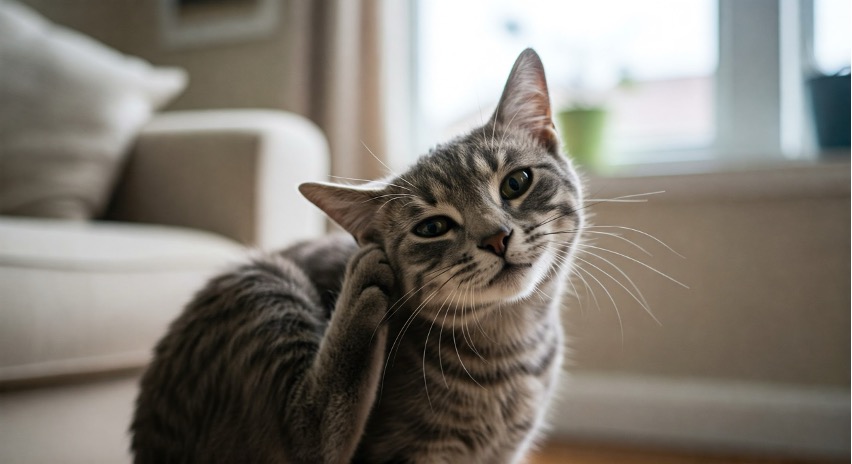
Why Flea Prevention Is Important for Cats
Fleas may be small, but once they get on your cat, they can quickly become a big problem. Their bites itch, of course, but they can also carry diseases, trigger allergic reactions, and transmit other parasites, like tapeworms.
Preventing and treating flea infestations is an important part of keeping your cat happy and healthy. If prevention measures fail and you find yourself in the midst of a feline flea problem, it’s important to act fast and give your cat the proper care.
Health Risks of Fleas
Fleas are more than just another nuisance of nature. They may be small, but flea infestations can spell big trouble for your cat if left untreated. Some flea-related health concerns include:
- Itching: Flea bites can cause your cat to scratch and groom excessively, leading to hair loss, scabs, and even infections.
- Allergies: Flea allergy dermatitis (FAD) is a common condition caused by sensitivity to flea saliva.
- Parasites: Cats can swallow infected fleas during grooming, leading to tapeworm infections.
- Anemia: Severe flea infestations can cause anemia, especially in kittens and senior cats.
Explore our Cat Flea & Tick Medication to keep your feline protected.
Why Choosing the Right Flea Treatment Matters
Picking the right non-prescription flea treatment shouldn’t be a guessing game. Preventative measures help you stay ahead of the problem, saving you money and time. However, if your cat already has fleas, repellants alone won’t do the trick.
Over-the-counter flea medicines vary in their potency, efficacy, and formulas. The right solution can help your pet find fast relief, while the wrong one might leave them suffering longer than necessary.
For a variety of trusted options, explore pharmaceutical treatments for cats.
Best Over-the-Counter Flea Medicines for Cats
These OTC flea treatments offer effective, vet-trusted protection for cats without the need for a prescription.
Advantage XD
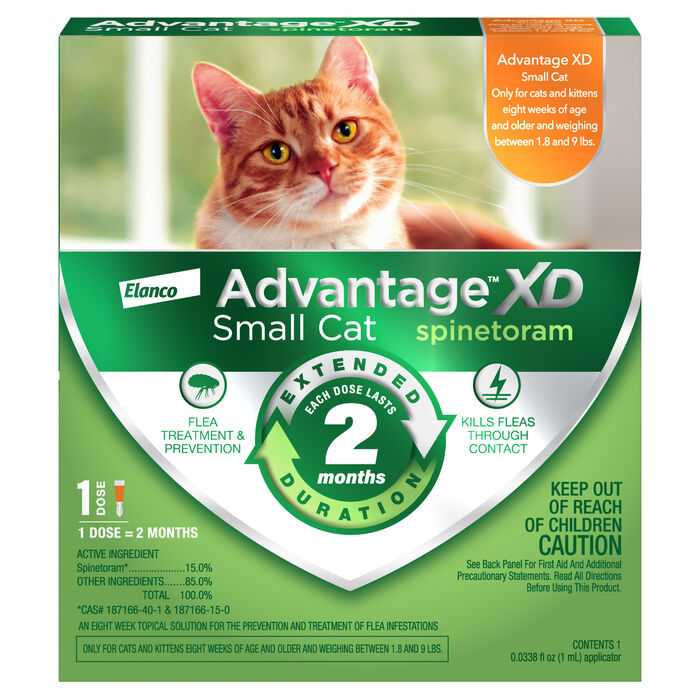
Key Features:
- Provides 2 months of protection
- Naturally-derived active ingredient
- No prescription required
Advantage XD offers up to 60 days of continuous protection from a single dose and goes to work within 30 minutes. It’s safe for indoor and outdoor cats alike and kills fleas on contact.
Things to Consider: Like most topical treatments, it may cause skin irritation in some cats. Always monitor your cat for redness or swelling.
Seresto for Cats
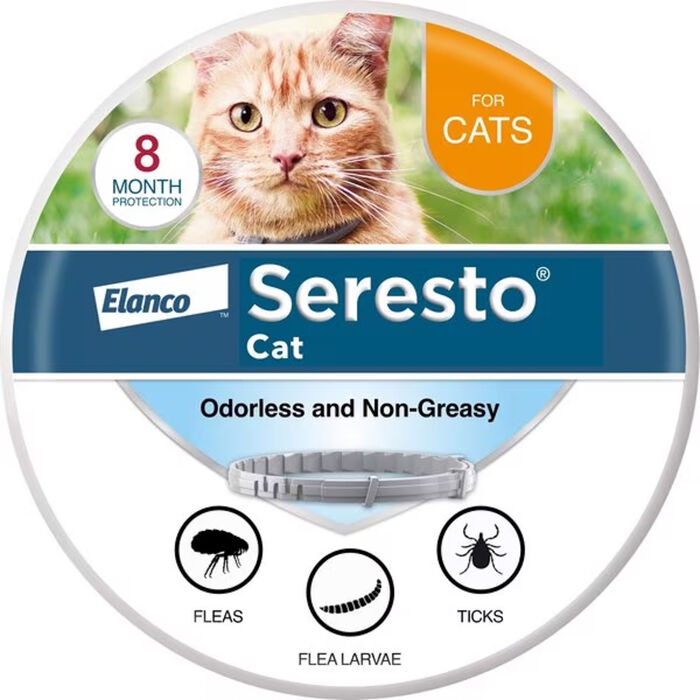
Key Features:
- Long-lasting protection
- Kills fleas and ticks on contact
- Adjustable and odorless
Seresto is a budget-friendly, long-lasting flea collar that provides eight months of continuous protection. It repels and kills fleas, larvae, and ticks without messy application.
Things to Consider: Some cats may not tolerate collars well or could develop mild skin irritation.
Capstar Flea Treatment Tablets
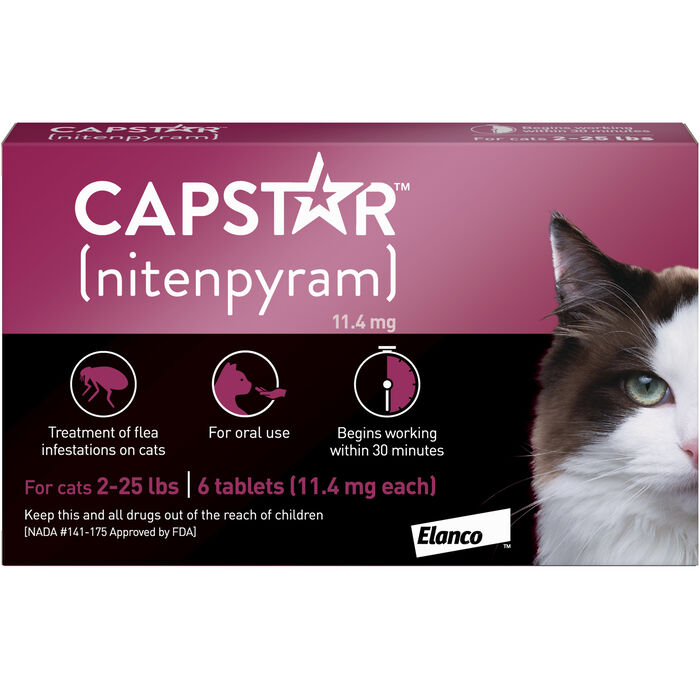
Key Features:
- Starts killing fleas within 30 minutes
- Ideal for fast relief
- Unflavored tablets
Capstar is a fast-acting oral flea treatment that kills most adult fleas within six hours. It’s safe for pregnant and nursing cats and works well for quick infestations.
Things to Consider: Capstar kills adult fleas but isn’t designed for long-term protection. Combine it with preventative products for best results.
Alzoo Flea & Tick Spray
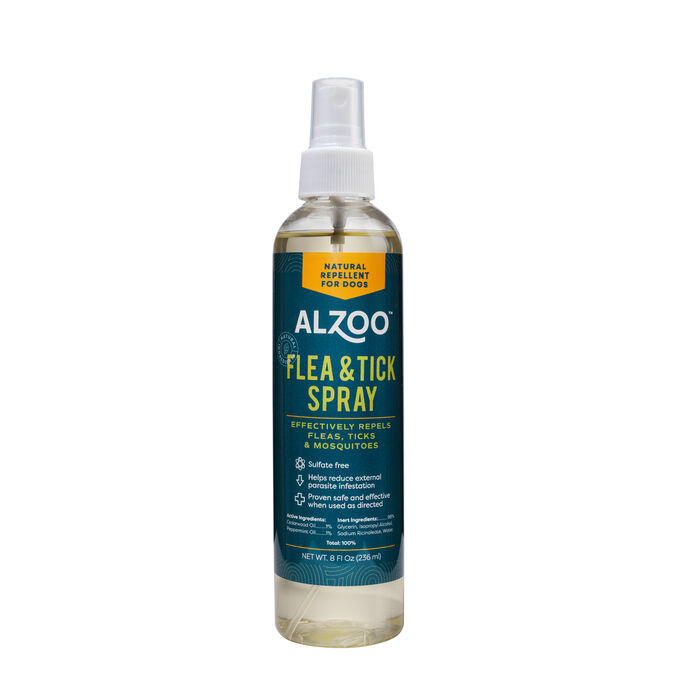
Key Features:
- Plant-based and non-toxic
- Protects against fleas, ticks, and mosquitoes
- Affordable and easy to use
Alzoo’s spray uses natural ingredients like peppermint oil to deter fleas and disrupt their life cycle. It’s gentle, sulfate-free, and suitable for multi-pet households.
Things to Consider: Natural sprays may not be as potent for treating active infestations but work well as part of a broader flea control plan.
Do Natural and DIY Flea Remedies Work?
If you’re considering natural flea remedies, here’s what to know:
- Diatomaceous Earth: Kills fleas by drying them out but can irritate your cat’s skin or lungs if applied directly.
- Apple Cider Vinegar Spray: May repel pests but doesn’t kill fleas; always dilute before use.
- Flea Combs: Useful for removing fleas manually but not a complete treatment.
Natural options can support prevention but usually aren’t strong enough for infestations. For the best protection, pair them with proven Flea Control Products.
When to See a Veterinarian
Call your veterinarian if your cat:
- Keeps scratching despite OTC treatment
- Shows signs of anemia like pale gums and fatigue
- Has vomiting, drooling, or redness after treatment
- Develops flea allergy dermatitis (FAD) or skin sores
If over-the-counter options aren’t working, your vet can prescribe stronger flea control products tailored to your cat’s needs.
Final Thoughts
Fleas may be small, but they can cause big problems for cats. Prevention is easier than elimination, so use effective flea treatments before an infestation begins. If your cat already has fleas, options like Advantage XD, Seresto, or Capstar can help restore comfort fast.
Explore all Flea and Tick Prevention for Cats to find the right solution and keep your feline friend flea-free year-round.half to manage, but picking the right treatment can give your cat the fast, effective relief they deserve!






